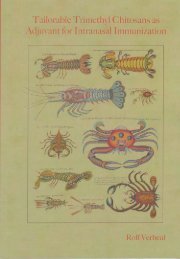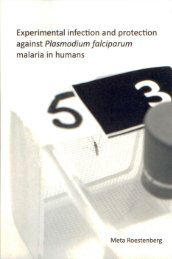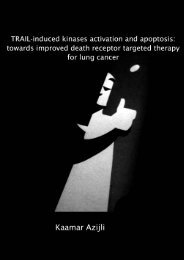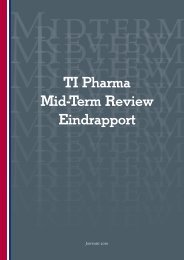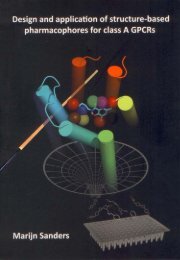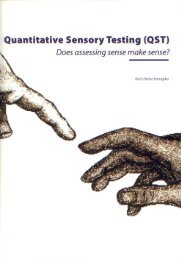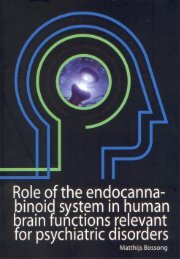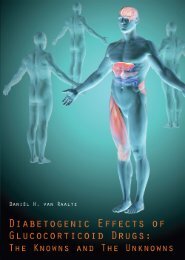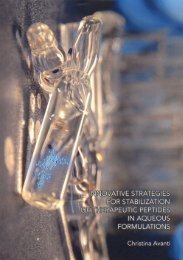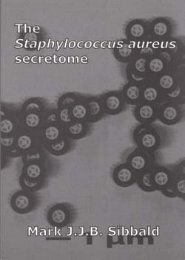The vagus nerve as a modulator of intestinal inflammation - TI Pharma
The vagus nerve as a modulator of intestinal inflammation - TI Pharma
The vagus nerve as a modulator of intestinal inflammation - TI Pharma
Create successful ePaper yourself
Turn your PDF publications into a flip-book with our unique Google optimized e-Paper software.
Chapter 3<br />
Figure 2. Inhibition <strong>of</strong> macrophage activation by nicotine requires transactivation <strong>of</strong> STAT3<br />
but not SOCS3 expression. (a) TNF in the supernatants <strong>of</strong> peritoneal macrophages transiently<br />
transfected with dominant negative STAT3D, wild-type STAT3 (STAT3 WT) 17 or empty vector (Vector),<br />
then incubated with nicotine and stimulated with 10 ng/ml <strong>of</strong> endotoxin. Values are expressed <strong>as</strong> the<br />
percent <strong>of</strong> TNF rele<strong>as</strong>ed without the addition <strong>of</strong> nicotine for each group. Data are mean +/-s.e.m. <strong>of</strong><br />
three independent experiments done in duplicate. * , P < 0.05 (one-way analysis <strong>of</strong> variance followed by<br />
Dunnett’s multiple comparison test). (b) Immunoblot for phosphorylated STAT3 (PY-STAT3), STAT3 and<br />
SOCS3 in peritoneal macrophages transiently transfected with control oligonucleotide or SOCS3-specific<br />
small interfering RNA (siRNA), then incubated with 100 nM nicotine. Blot is representative <strong>of</strong> three<br />
independent experiments. (c) TNF in the culture supernatants <strong>of</strong> peritoneal macrophages transfected with<br />
control oligonucleotide or SOCS3 siRNA, then preincubated with nicotine and stimulated with 10 ng/ml<br />
<strong>of</strong> LPS. Data are presented <strong>as</strong> percentage <strong>of</strong> TNF produced without addition <strong>of</strong> nicotine for each treatment<br />
group and are the mean +/-s.e.m. <strong>of</strong> three independent experiments done in duplicate.<br />
and methyllycaconitine blocked the nicotine-induced STAT3 activation (Fig. 3a).<br />
A prominent function for the α7 receptor in nicotine-induced deactivation <strong>of</strong><br />
macrophages corroborates published reports on human and mouse monocyte-derived<br />
macrophage cultures 3,4 . <strong>The</strong> selective non-α7 nAChR antagonist dihydro-βerythroidine<br />
did not affect nicotine-induced STAT3 activation (data not shown).<br />
Blocking nAChR also counteracted the attenuation <strong>of</strong> proinflammatory mediator<br />
rele<strong>as</strong>e by nicotine in activated macrophages. Hexamethonium, d-tubocurarine and<br />
methyllycaconitine prevented the reduction in endotoxin-induced rele<strong>as</strong>e <strong>of</strong> IL-6 (Fig.<br />
3b) and MIP-2 (data not shown) by nicotine in a dose-dependent way. Hexamethonium<br />
(effective dose leading to 50% inhibition (ED 50 ), 6.46 +/-2.90 nM) w<strong>as</strong> more potent<br />
than methyllycaconitine (ED 50 , 24.0 +/-3.4 nM) and w<strong>as</strong> far more potent than<br />
d-tubocurarine (ED 50 , 0.80 +/-0.23 +/-M) in attenuating the inhibition <strong>of</strong> IL-6 rele<strong>as</strong>e<br />
(Fig. 3b). <strong>The</strong> high ED 50 for d-tubocurarine is probably due to its low affinity for α7<br />
nAChRs 18 and is in line with its modest inhibitory effect on STAT3 activation by<br />
nicotine (Fig. 3a). In addition to methyllycaconitine, α-bungarotoxin abolished IL-6<br />
reduction by nicotine. However, exposure <strong>of</strong> the cells to α-bungarotoxin decre<strong>as</strong>ed<br />
IL-6 production in the presence and absence <strong>of</strong> nicotine, which compromised adequate<br />
determination <strong>of</strong> its ED 50 (data not shown). Thus, STAT3 activation is dependent on<br />
the activation <strong>of</strong> nAChRs by nicotine, most likely exclusive through activation <strong>of</strong> the<br />
α7 nAChR subunit.<br />
48



